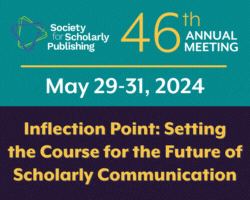As part of the annual Charleston Conference, the Society for Scholarly Publishing (SSP) will offer a Pre-Conference Workshop titled, All About the User Experience: Researcher Perspectives on Access, Privacy, and Security in Scholarly Communications, on Tuesday, November 6, 2018, from 9:00 AM – 12 PM Eastern Time.
Registration for the event remains open with a discount available for SSP members.
Researchers today use a multitude of tools and services to conduct their research and find themselves grappling with the inter-related issues of access, privacy, and security. Despite the advances in scholarly communication tools available to them, researchers face obstacles as they utilize the information resources provided by their libraries (and beyond). Platform and services providers, as well as publishers and libraries, need to understand the challenges faced by researchers—the entire scholarly communication cycle will benefit from a smooth and efficient researcher workflow.
Heather Staines, Director of Partnerships, Hypothesis, will emcee the event, and Jean Shipman, Vice President, Global Library Relations, will moderate the panel discussion. Our researchers include Les Lenert, Chief Research Information Officer, Medical University of South Carolina , Vice President and Chief Medical Officer, Health Sciences South Carolina, Briana McGinnis, Assistant Professor of Political Science, College of Charleston, David Preston, Westvaco Professor of National Security Studies, The Citadel, and Suparna Qanungo, Research Assistant Professor in the College of Nursing, Medical University of South Carolina. Our speakers from the library side include Lisa Janicke Hinchliffe, Professor/Coordinator for Information Literacy Services and Instruction in the University Library, University of Illinois at Urbana-Champaign, Harish Maringanti, Associate Dean, IT & Digital Library Services, J. Willard Marriott Library, University of Utah, and Rich Wenger, eResource Systems Manager, MIT Libraries.
Heather took the time to answer questions about the event:
Who is the intended audience for this workshop and why should they attend?
The planning committee took particular care to try to put together an event that would appeal to publishers, librarians, platform and services providers, and researchers themselves. We wanted to provide a forum for researchers from many fields to discuss their workflows and to include the perspective of librarians who must balance researcher workflow and library services. The panel will include both researchers and librarians, and the second part of the workshop will involve attendees in roundtable discussions.
Why do you think this topic is important and timely?
There has been a lot of discussion in recent years about balancing user privacy with information needed to provide personalization services. Librarians have been very involved in the conversation. We wanted to hear directly from researchers about their process, their pain points, and how (and if) privacy and personalization figure into their daily routine. With ongoing discussions of protecting user data in the context of the European General Data Protection Regulation and beyond, publishers and service providers have been forced to give careful consideration about what information they collect, store, share, and why they do so. There have also been ongoing examinations about researcher access to content and how it is complicated by off campus access and instances when they might be challenged with a paywall for resources to which the library subscribes. Frustration over access can drive them to sites like Scihub for ease of access, but stolen or compromised user credentials can have privacy and security implications on campus well beyond publisher content.
Is there a particular topic you’re looking forward to seeing discussed?
As a historian by training—but one who works more with researchers in the STM field now—I’m very curious to hear how researcher workflows differ by discipline. I’m also excited to hear from some early career researchers, as their workflow process can differ considerably from their more senior colleagues. Whether you are a publisher or a content provider of books, journals, or databases, you should find the workflow discussion valuable.
What do the selected speakers bring to the discussion?
At industry events, you often hear that a platform or tool meets “researcher needs,” but this will be an opportunity to hear directly from researchers about what they need from their libraries and from content providers. Each speaker brings a unique perspective based upon their area of study, their academic background, and their varied roles on campus, from teaching to advising to research and publishing. We have Briana, a new assistant professor just a few months into her first academic position, but who brings considerable international experience to the panel. Then there’s David, an award-winning author who teaches U.S. military history to cadets and officer candidates. We’ve got Les, who has been a practicing primary care physician and has also has conducted more than twenty years of research on how to make health care safer. And finally, we’ll hear from Suparna, a cancer biologist by training who works closely with faculty and students at all levels. We’re so excited to find such wide expertise in Charleston! Our librarian speakers are joining us from further afield, Rich from the east coast, Lisa from the midwest, and Harish from out west. Each brings a keen interest in providing the best experience to researchers and students through library resources, workflow tools, and essential services.
What can attendees expect from the workshop? What do you hope attendees will take away from the workshop?
The morning panel will offer a unique mix of researchers and librarians, addressing important questions about their daily activities. Come prepared with your questions! The roundtables will provide an opportunity to do deep dives into topics of interest such as privacy, personalization, and access. We expect a lively session! We hope that attendees will leave with a better understanding of where workflows across disciplines are similar and where they differ and how librarians can help such a diverse range of disciplines. Together, we can focus on practical steps that will benefit researchers and those who support them across the research workflow lifecycle.
Click here to register now.



Join the Conversation
You must be logged in to post a comment.